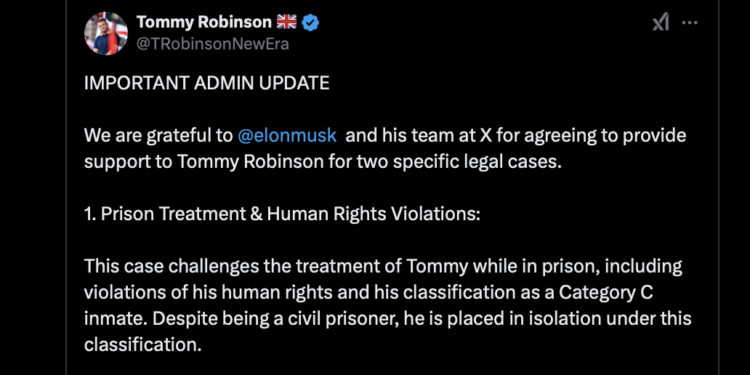Elon Musk has reportedly agreed to fund the legal defence of jailed British patriot Tommy Robinson, in a move that could further strain relations between the tech billionaire and British political establishment.
According to a statement released through Robinson’s social media accounts, Musk and his team at X have committed to providing support for two specific legal cases. “We extend our heartfelt gratitude to Elon and his team for their unexpected and generous assistance,” the statement read.
Robinson, who is currently serving an 18-month sentence for contempt of court, faces legal challenges on multiple fronts. The first case concerns his treatment in prison, where his team claims violations of his human rights regarding his classification as a category C inmate and subsequent isolation. The second relates to charges under the Terrorism Act following his refusal to grant police access to his phone.
The alleged support from Musk comes amid growing controversy over the billionaire’s involvement in British politics. The X owner has repeatedly called for Robinson’s release and voiced support for an inquiry into grooming gangs, while also reportedly considering donations to Reform UK.
The timing of the announcement is particularly sensitive, as Musk faces separate criticism over allegations of making a Nazi salute at former President Trump’s inauguration – claims he dismissed on X as “sooo tired” attacks.
Labour leader Sir Keir Starmer faces mounting pressure over Musk’s increasing influence in British political discourse, with concerns growing about the tech mogul’s apparent willingness to intervene in domestic affairs.
Neither Musk nor his team have publicly confirmed the funding arrangement, and they have not responded to requests for comment. Robinson, whose real name is Stephen Yaxley-Lennon, has accumulated multiple criminal convictions over the years, including for assault, mortgage fraud, and contempt of court.
The development marks another chapter in the relationship between one of the world’s richest men and British political institutions, raising questions about the influence of tech billionaires on national justice systems.

































